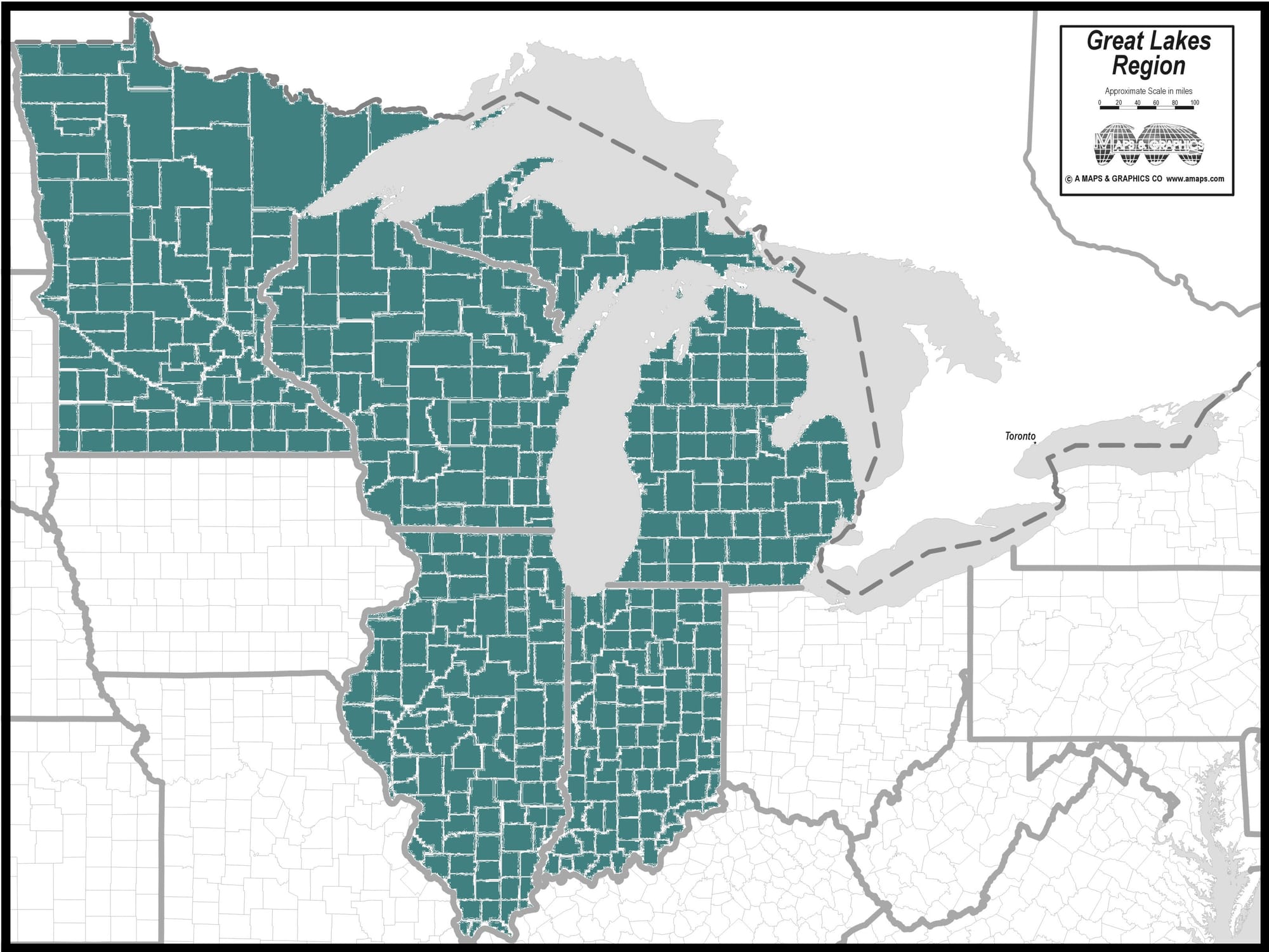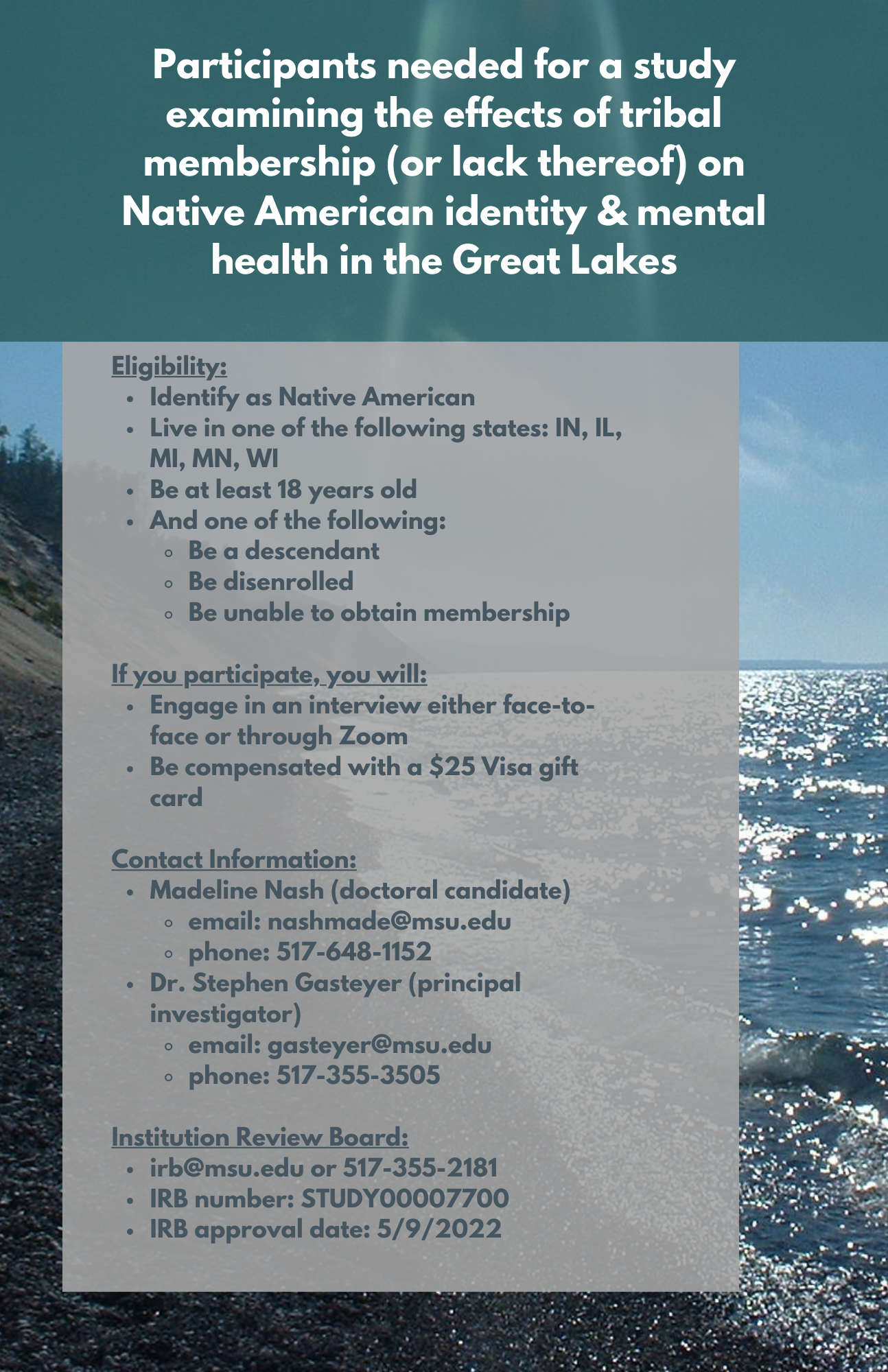Madeline Nash
Doctoral Candidate in the Department of Sociology
Michigan State University
About me
I am a doctoral candidate in the Department of Sociology with a graduate affiliation in American Indian and Indigenous Studies at Michigan State University. I received my B.A. in Philosophy in 2012, a B.A. in Sociology in 2015, and an MA in Sociology in 2022, all from MSU. I am an enrolled member of the Sault Ste. Marie Tribe of Chippewa Indians and identify as an Anishinaabekwe.
I have lived in Anishinaabe territory my whole life and currently reside in Nkwejong (Lansing, MI) with my husband and three daughters. I have strong ties to the Upper Peninsula where I often spend summers visiting with my family.
During my childhood, my uncles and cousins fished Lake Michigan for Whitefish and consequently, I have always felt connected to the Great Lakes.


Research
RESEARCH INTERESTS
Migration has always fascinated me, specifically its impacts on Indigenous communities. Consequently, my main research areas focus on migration, health, and race/ethnicity. I am particularly concerned with understanding how patterns of colonization have impacted Indigenous identities, and how colonialism has, and continues to affect Indigenous people’s physical, emotional, mental, and spiritual well-being.
Current ResearchI am currently conducting my dissertation research using a semi-decolonized, mixed methods approach to understand Indigenous/Native American mental health in the Great Lakes region. For my quantitative study, I am analyzing BRFSS data on mental health outcomes in people who identify as Indigenous/Native American in Indiana, Illinois, Michigan, Minnesota and Wisconsin. To understand the relationship between tribal enrollment, Indigenous identity and mental health in people who identify as Indigenous/Native American in the Great Lakes region, I am currently conducting a qualitative study (see Current Project for more information).
Past Research
For my qualifying paper, I examined differences in mental health outcomes between Native Americans that reside in Tribal areas to those who do not. Pooling data from the National Drug Use and Health Survey (NSDUH), 2014-2017, and controlling for sociodemographic variables, I found mixed results. On measures of serious psychological distress (SPD), there were no significant differences between these populations. However, there was a significant difference in suicide ideation. Living in tribal areas lowered one’s odds of having serious thoughts of suicide.
More recently, I worked as a research assistant for Dr. Danielle Gartner (Epidemiology) and Dr. Heather Howard Bobiwash (Anthropology) on a pilot study, “Indigenous Approaches to Postpartum Mental Health: Assessing Opportunities for Community-based Growth and Solutions.” This project was in collaboration with the Inter-Tribal Council of Michigan, Inc. (ITC), a consortium of Michigan’s federally recognized tribes.

Current Project
As part of my dissertation research, I am currently conducting a qualitative study on the effects of Tribal enrollment (or lack thereof) on Native American/Indigenous identity and mental health in the Great Lakes region. As a member of the Sault Ste. Marie Tribe of Chippewa Indians and the granddaughter of a boarding-school survivor, I am aware that people who identify as Native American/Indigenous often encounter stressors that are unique to our communities. I am interested in interviewing people who identify as Native American/Indigenous; live in either Illinois, Indiana, Michigan, Minnesota, or Wisconsin; are at least 18 years of age; and are one of the following:
- Have been disenrolled from a federally recognized tribe
- Are considered a descendant
- Are unable to obtain enrollment in a federally recognized tribe

Interview questions are centered around identity, enrollment status, experiences with Native/Indigenous communities, cultural/political involvement, experiences with racism, pretendians, mental health, substance use, and historical trauma.
All answers are kept anonymous and identifying information will be excluded in presentations/written materials presenting study results.
Interviews last approximately 60-90 minutes and can be conducted via phone or via video conference (i.e., Zoom). Because of the time and effort involved, participants are gifted a $25 VISA card.
If you are interested in participating in this study and meet the eligibility requirements please contact me. Data collection will wrap up at the end of August.

Teaching
I have a passion for teaching and I enjoy interacting with students. I often take a conversational approach when I lecture and value my students' contributions to discussion. Additionally, I use other methods, such as games and music, to engage my students.
My main goal, when I teach, is to instill in my students an appreciation of how helpful sociological frameworks and concepts can be when applying them to their own experiences.
I have taught both in-person and online (synchronously and asynchronously).
INSTRUCTOR
SOC 475 Health & Society, Summer 2023, 2022 and 2021
Course Description: This course examines the social roots of health and disease. Rather than understanding health from an individual perspective, students examine how SES, gender, race and ethnicity, as well as sexual orientation affects health outcomes. Some of the topics covered include: medicalization and construction of illness, fundamental cause of disease, social support and social networks, as well as health care interactions/access. By engaging with these topics, students develop a social structural perspective for health that can be applied to careers in medicine, public health, health policy, and social science.
SOC 316 Youth & Society, Summer 2020
Course Description: This course focuses on youth and societal issues by examining the interactions and behavioral changes that occur among youth during adolescent development in reference to biological, social, cultural as well as historical conditions. Topics covered in youth studies include: employment, health, crime and deviance, family issues, identity, and education. This course investigates how youths transition into adults and how youth experience shapes worldviews and life trajectories.
TEACHING ASSISTANT
SOC 100 Introduction to Sociology (recitation sections)
SOC 282 Quantitative Analysis for Social Research (recitation sections)
SOC 316 Youth & Society
SOC 215 Race & Ethnicity
SOC 315 Family & Society
SOC 325 Play, Games & Sports
Publications & Presentations
Examining Mental Health In Indigenous Populations: Tribal Areas Vs. Non-Tribal Areas
Read MoreCV
Contact
- East Lansing, Michigan, United States



